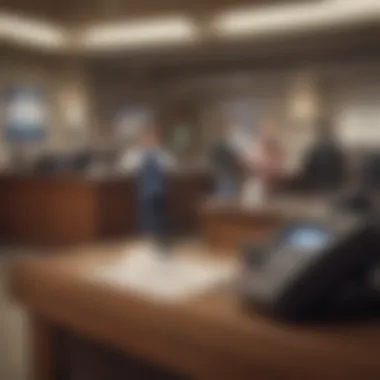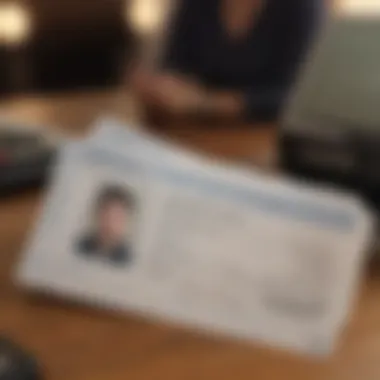Cashing Your Check: A Comprehensive Guide


Intro
Cashing a check can be a straightforward process, yet it involves several considerations that must be understood. As we dive into various methods and strategies for effectively cashing checks, it becomes essential to consider the places where checks can be cashed and the necessary documentation required.
Many people may find themselves in situations where understanding this process is not just useful but also crucial for managing finances successfully. This section will shed light on the options available and the potential challenges that might arise.
Market Overview
Cashing checks in today's financial landscape requires an awareness of current market practices and consumer needs. Many factors are influencing how individuals choose to cash checks and where they seek services.
Current Market Conditions
In the present economic environment, there is a shift towards digital payment methods, yet checks are still prevalent. Many consumers continue to receive checks for various reasons, including salaries, refunds, or payments for services. Despite the rise of electronic payments, check cashing services remain relevant.
Key Economic Indicators
When it comes to cashing checks, understanding the broader economic indicators can help evaluate the overall health of check issuance and acceptance. Some of these indicators include:
- Employment rates that influence salary checks issued.
- Consumer spending which affects payments made by businesses.
- Interest rates that could affect banks' willingness to cash checks without additional fees.
Major Market Trending Factors
Several trends are shaping the check-cashing market:
- The growth of mobile banking apps that enable users to deposit checks remotely.
- Increasing fees associated with cashing checks at physical locations.
- A rising interest in alternative financial services among those without traditional bank accounts.
These trends depict a changing landscape where traditional banking methods meet new technologies and evolving consumer expectations. Understanding these conditions is essential for anyone looking to navigate the check cashing process effectively.
Identification Requirements
Before cashing a check, individuals must present valid identification. Common forms include a driver's license, state ID, or passport. Failure to provide appropriate identification may result in delays or refusal to cash the check.
Fees to Consider
Many venues charge fees for cashing checks. Understanding these costs is vital for financial planning. Consider the following:
- Retail stores may charge a flat fee.
- Check cashing services often have higher rates, especially for large amounts.
- Banks may waive fees for account holders under certain conditions.
Common Pitfalls to Avoid
While cashing checks can be simple, there are pitfalls to be aware of that can complicate the process:
- Not understanding the terms of the service, including fees.
- Choosing venues with high fees without considering alternatives.
- Ignoring the importance of verifying the legitimacy of the check beforehand.
Check cashing can be a financial lifeline for many, but it is essential to be informed and vigilant at all stages.
Understanding these aspects will prepare readers to make informed decisions regarding cashing checks, whether for personal needs or professional transactions.
Understanding Checks
Understanding checks is crucial for anyone involved in financial transactions. A check serves as a written order directing a bank to pay a specific amount of money from one person or entity to another. The nuances of checks, their various types, and their uses play a significant role in personal finance management. By gaining insight into these elements, readers can navigate check processing and cashing with confidence.
What is a Check?
A check is a financial instrument that allows the payer to instruct their bank to transfer funds to the payee. This often involves a written document containing key information, including the date, the amount in both numeric and word formats, and the signatures of the payer. Checks offer a means of payment that is more secure than cash and allows for easier tracking of expenditures.
Types of Checks
Checks come in various forms, each serving distinct functions and contexts. Knowing the differences among them can help individuals choose the right type for their needs.
Personal Checks


Personal checks are issued by individuals and drawn from their checking accounts. Their main characteristic is their flexibility, as they can be used for personal transactions, bill payments, or everyday purchases.
The widespread use of personal checks is beneficial because they are convenient and typically free to issue. However, they have unique features, such as requiring sufficient funds in the issuing account to avoid bouncing. This can pose a disadvantage during transactions and might lead to overdraft fees.
Cashier's Checks
Cashier's checks are special checks guaranteed by a bank. They are often used in larger transactions, like real estate deals or car purchases, where a paper trail is essential. A key characteristic is that the funds are withdrawn from the bank's account rather than the issuer's account, providing security and assurance to the recipient.
One unique aspect of cashier's checks is the lower risk of bouncing because they are backed by the bank’s funds. This makes them a favorable choice when a seller requires reassurance of payment. The downside, however, is the potential fees for acquiring a cashier’s check, which can range from a small amount to a significant fee depending on the bank's policy.
Certified Checks
A certified check is another type of secure payment instrument. It is issued by a bank after verifying that the payer has sufficient funds. This process assures the payee that the funds are guaranteed.
The critical feature of certified checks is that once a bank certifies it, the funds are withdrawn from the payer's account, ensuring availability. However, certified checks often incur fees similar to cashier's checks, which can make them less favorable for smaller payments.
Government Checks
Government checks include payments issued by government entities, such as tax refunds or social security payments. Their distinguishing feature is their reliability and typically quick processing time. Recipients know this type of check is secure, as it comes directly from government funds.
The primary advantage of government checks is their perceived trustworthiness. However, they might require special handling at some financial institutions, and endorsement processes could be more stringent than for personal checks.
In summary, understanding different types of checks and their uses is pivotal in making informed financial decisions. Each type has its strengths and weaknesses, influencing the choice depending on the specific context of the transaction.
Where to Cash a Check
Cashing a check is a straightforward task, yet where you choose to do so can significantly affect the experience. Different venues offer various advantages and drawbacks. Understanding where to cash a check is important for a few reasons. Location can determine how quickly you access funds, what identification may be required, and any associated fees.
Banks
Banks are one of the most common places for cashing checks. They usually offer many benefits, including a secure environment and experienced staff to assist with the process. When you cash a check at a bank where you hold an account, the process is often seamless. Simply present your check along with a valid form of identification.
However, if you don’t have an account at the bank, you might face fees or rejection. Most banks allow you to cash checks if they are from their own institution. It's important to check if the bank has any policies that might affect you, such as specific eligibility requirements.
Credit Unions
Similar to banks, credit unions offer a place to cash checks, frequently with lower fees. If you are a member of a credit union, it can be especially beneficial because services may include free check cashing. Many credit unions have less stringent cancellation policies and can provide personalized customer service.
However, not all credit unions will cash checks from non-members, so it is crucial to call ahead or check their policies online. Having a membership may also speed up processing times for your check cashing.
Check-Cashing Stores
Check-cashing stores are convenient but often come with higher fees compared to traditional banks and credit unions. These stores specialize in cashing checks quickly. They don’t usually require you to have a bank account, which can be appealing if you are unbanked or temporarily in need of cash.
However, be cautious. The fees can vary significantly from one location to another. Some places may charge up to 10% of the check’s amount. Before visiting, consider calling to ask about their rates.
Retail Locations
Many retail locations, such as supermarkets or big-box stores, provide check-cashing services. This option is often more accessible since you can handle multiple errands at once. Stores like Walmart offer such services at relatively lower fees compared to specialized check-cashing stores.
Take note that retail locations might have limits on the size of checks they can cash. If you're cashing a large check, it may not be an option. Always bring proper identification, as most stores will require it.
Important Note: Check cashing policies can differ widely. Always verify with each venue beforehand to understand their process, fees, and any requirements needed to successfully cash your check.
Requirements for Cashing a Check
Understanding the requirements for cashing a check is crucial for anyone looking to access their funds quickly and efficiently. Navigating the process without the necessary documentation can lead to frustration, delays, or even the inability to cash the check entirely. In this section, we will delve into the essential elements involved in cashing a check, focusing on the identification needed and considerations for account holders.
Identification Needed
When cashing a check, one of the primary requirements is presenting valid identification. This step is fundamental for various reasons, including verifying your identity and ensuring the legitimacy of the transaction. Most establishments will request an official form of ID, which may include:


- Driver's License: A common form of identification, often used due to its wide acceptance.
- Passport: Provides international recognition and is considered a secure form of identification.
- State Identification Card: An alternative for those who do not drive.
Different institutions may have specific requirements regarding the type of identification they accept. For instance, banks typically require a government-issued photo ID, while check-cashing stores may accept a wider range of documents. It is advisable to check with the specific place where you intend to cash your check to ensure you bring the correct identification.
Proper identification is not just a formality, but a necessary step to reduce the risk of fraud.
Account Holder Considerations
If you are the account holder from which the check is drawn, this can simplify the cashing process. However, there are still several key considerations to keep in mind. First and foremost, you should ensure that you have sufficient funds in your account to cover the check amount. If the funds are not available, your check could bounce, which may incur fees and can negatively affect your banking relationships.
Moreover, if you are cashing a check in your name, be aware that certain institutions may impose limits on the amount you can cash without additional scrutiny. Larger amounts may require additional documentation or verification. Furthermore, consider the check date; checks that are too old may be declined, making timely cashing essential.
In summary, understanding what is required to cash a check can save a lot of trouble later. By being prepared with proper identification and considering your account status, you can facilitate a smooth transaction. Awareness of these requirements also helps in preventing common issues associated with check cashing.
Fees and Charges
Understanding fees and charges related to cashing checks is crucial for anyone wanting to manage their finances effectively. These fees can vary significantly across different locations and can impact the total sum you receive after cashing your check. Knowing the nuances of these charges can help you make informed financial decisions that suit your budget and lifestyle.
Understanding Check-Cashing Fees
Check-cashing fees are amounts charged when you cash a check, often depending on the type of check and where it is cashed. Some locations charge a percentage of the check amount, while others may impose a flat fee. Here are key points to keep in mind:
- Percentage-based Fees: Many establishments, especially check-cashing stores, will charge a fee based on a percentage of the check amount. For instance, if you cash a $1,000 check and the store charges a 2% fee, you would pay $20.
- Flat Fees: Some places might charge a fixed fee, regardless of the check size. This can be beneficial for larger checks but may not be cost-effective for smaller ones.
- Membership Fees: For credit unions or banks, there may be membership or account-maintenance fees which can affect the overall cost of cashing a check.
- Service Quality: Higher fees do not always equate to superior service. It's essential to evaluate if the fee aligns with the convenience and safety provided.
Understanding these aspects helps you calculate the net amount you will receive after cashing your check, allowing for better financial planning.
Comparing Costs Across Venues
When considering where to cash a check, compare costs across various venues. Here’s a breakdown of typical options:
- Banks: If you have an account, cashing checks at your bank may be the least expensive option, often with little to no fee.
- Credit Unions: Similar to banks, credit unions often have lower fees, especially for members. It is worthwhile to check for any specific member benefits.
- Check-Cashing Stores: While convenient, these places can have high fees, especially for larger amounts. Always inquire about their fee structure before proceeding.
- Retail Locations: Grocery stores or major retailers may also offer check-cashing services, sometimes at competitive rates. Knowing their policy can save you money.
It is advisable to consider both the fees and the convenience factor associated with each venue. Comparing costs not only affects the immediate financial transaction but also impacts long-term budgeting and financial stability.
“Always calculate the total cost, including fees, before deciding where to cash your check.”
Potential Issues When Cashing a Check
Cashing a check is a straightforward process for many, but it is not without its potential pitfalls. Understanding the issues involved in cashing checks is essential to prevent inconveniences and financial losses. This section delves into two critical aspects: check verification processes and the risk of fraudulent checks. Both elements are interlinked yet present unique challenges when engaging in check cashing.
Check Verification Processes
In various financial institutions, a robust check verification process is vital to safeguard against fraud. When you present a check for cashing, the institution will validate several details.
- Authenticity of the Check: Verification involves checking if the check is legitimate. This includes confirming the signature, verifying the bank details, and ensuring the account has sufficient funds.
- Check Validation Systems: Many banks use systems such as TeleCheck or Check B scanning. These systems quickly assess the check's authenticity and the account status.
- Time Considerations: Verification may take time, especially if it involves contacting the issuing bank. As a result, individuals may encounter delays in receiving their cash.
The verification process is beneficial because it helps prevent cashing checks that could bounce or are not backed by available funds. However, it can be frustrating for individuals who require quick access to their cash. Understanding this process helps set realistic expectations.
Fraudulent Checks
The rise of digital transactions has unfortunately also increased the prevalence of check fraud. It is crucial to remain vigilant to avoid becoming a victim.
- Types of Fraud: Common fraudulent checks include counterfeit checks, forged signatures, and altered amounts. Each type presents distinct challenges and requires different responses.
- Consequences of Cashing a Fraudulent Check: Cashing a fraudulent check can lead to severe repercussions like bank fees, legal issues, or even criminal charges. It is essential to be aware that even if a check appears legitimate, it may still be fraudulent.
- Protective Measures: To protect oneself, one should always verify the issuing party. Contacting the business or individual directly can clarify the check's legitimacy. Moreover, use secure channels when discussing any sensitive information related to checks.
In sum, recognizing potential issues when cashing checks is essential. By adequately preparing for verification processes and being aware of fraudulent checks, individuals can mitigate risks and enhance their financial security.
Taking the time to verify checks can save you significant trouble in the long run.
Alternatives to Check Cashing
Cashing a check may not always be the most convenient or cost-effective option. Understanding alternatives provides individuals with other means to access their funds. Many financial institutions and payment methods exist today that cater to various preferences. These alternatives often offer benefits such as reducing fees, increasing security, and simplifying transactions.


Depositing Checks into Bank Accounts
Depositing checks into bank accounts is a straightforward alternative that many individuals overlook. This method typically involves going to a bank branch and depositing the check directly into one's account. With most banks, this process is simple and can be done via an ATM or through a mobile banking app. This mobile option allows users to take a picture of the check and submit it electronically.
Benefits of Deposit
- No Cashing Fees: Unlike check-cashing stores that may charge high fees, depositing directly into an account is usually free.
- Funds Security: Keeping the funds in a bank account can provide added security compared to carrying cash.
- Access to Funds: Once the check clears, individuals can access their funds through debit cards or online banking.
However, it is essential to consider that funds may take a few days to clear, depending on the bank's policies. Additionally, knowing cut-off times for deposits is necessary to avoid delays.
Direct Deposit Options
Direct deposit is another convenient method for receiving payments, particularly for employment wages or government benefits. This electronic transfer allows funds to be deposited directly into a bank account, significantly streamlining the payment process.
Key Advantages of Direct Deposit
- Speed: Funds are often available on the same day they are deposited.
- Reliability: Direct deposit reduces the risk of lost or stolen checks.
- Tracking: Transactions are automatically recorded in bank statements, aiding in financial tracking.
Choosing direct deposit typically requires providing your bank’s information to the institution or employer that issues the funds. It is a method favored for its efficiency, making it an optimal choice for those looking to avoid the hassle of cashing physical checks.
By selecting alternative methods to cashing checks, individuals take proactive steps towards improving financial management and reducing financial stress.
Utilizing these different options can enhance your monetary practices and ensure ease in managing funds in a rapidly changing financial landscape.
Best Practices for Cashing Checks
Cashing a check may seem straightforward, yet several factors can influence the experience. Following best practices ensures that the process is both secure and efficient. By being prepared and understanding the nuances of check cashing, individuals minimize potential issues and enhance their financial transactions.
Preparing to Cash a Check
Prior to cashing a check, taking preparatory steps is crucial. Ensuring that the check is valid is the first consideration. Check important details like the amount, signature, and date. A check that is dated for the future or lacks a signature may cause delays or rejection.
Next, gather necessary identification. Most banks and check-cashing locations require proof of identity. Generally acceptable forms include:
- Government-issued ID (e.g., driver's license, passport)
- Social Security card
- Any other reliable form of identification
It's advisable to verify this requirement ahead of time by contacting the venue. Additionally, consider the time of day you plan to cash your check. Banking hours differ, and convenience stores may have limited hours as well. Checking these times in advance can save you unnecessary trips.
Managing Check Cashing Within Your Budget
Cashing a check may involve fees which could impact overall finances. Understanding and managing these fees is important for financial health. Always inquire about the fee structure when choosing a venue to cash a check. For example, a check-cashing store may charge a higher fee compared to a bank.
When budgeting, consider the following:
- Fees incurred: Set aside funds to cover these costs.
- Frequency of cashing checks: Regular cashing can lead to cumulative fees, so evaluating needs versus costs is beneficial.
- Alternatives: If frequent check cashing is necessary, consider opening a bank account, which typically offers lower fees and better services.
Assessing your budget regularly ensures that check cashing remains a manageable part of your finances. Paying close attention to these aspects helps maximize the benefit of cashing checks while minimizing costs.
Important: Always keep track of checks you have cashed to avoid overdrafts or financial discrepancies in the future.
Culmination
In summation, the topic of cashing checks holds significant importance in the realm of personal finance. Understanding the various processes, requirements, and considerations involved allows individuals to navigate potentially complex transactions with ease.
Key Elements:
- Awareness of Venues: Knowing where to cash checks, be it at banks, credit unions, or check-cashing stores, can influence transaction efficiency and costs.
- Identification Requirements: Familiarity with necessary identification ensures a smoother experience and minimizes hurdles.
- Financial Implications: Recognizing fees associated with check-cashing can prevent unexpected financial strain.
- Risks of Fraud: Being informed about fraudulent checks enhances caution and protective measures when engaging in cashing transactions.
Understanding this fundamental skill of cashing checks is a practical necessity that influences broader financial behaviours and choices.
Final Thoughts on Cashing Checks
Cashing checks is frequently taken for granted, yet it is an essential aspect of managing personal finances. Several aspects merit attention when considering this process.
Firstly, individuals should evaluate their choices based on convenience and cost-effectiveness. Not all check-cashing methods are equal; while banks might offer the lowest fees, they may not always be the quickest option. Understanding these nuances can save both time and money.
Secondly, it is prudent to stay informed about potential changes in laws or procedures that could affect check cashing. Regulatory developments or variations in institutional policies can impact individuals unexpectedly, thus regular updates are advisable.
Finally, cultivating financial literacy through regular research and engagement with reputable resources is invaluable. Forums such as Reddit or educational platforms can provide useful insights and personal experiences that deepen one’s understanding.







